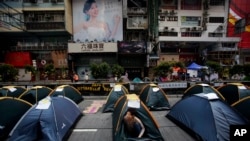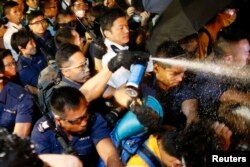Hong Kong police carried out a pre-dawn raid early Friday on a protest encampment, tearing down barricades, tents and canopies that have blocked city streets for more than two weeks.
Friday's raids involved an estimated 100 police, who targeted an area across Victoria Harbor from the main demonstration site in the city's financial district. Police in the busy Mong Kok district surrounded about 30 protesters, who left the area without resisting.
The raid was the third such police action to unblock city streets since late September, when protesters occupied the city's center to press China to stop interfering in upcoming local elections.
On Wednesday, hundreds of police - some wielding clubs and pepper spray - pushed back protesters battling for control of a road near city government headquarters.
Earlier, Hong Kong's top leader Leung Chun-ying says he is looking for ways to resume talks aimed at ending a week’s long pro-democracy protest that has snarled traffic and blocked commerce sections of Hong Kong. Talks could begin as early as next week.
Speaking at a news conference Thursday, Hong Kong Chief Executive Leung said he could offer no concessions on the 31 August edict of the Chinese National People’s Congress standing committee that the 2017 chief executive elections would proceed on the basis of one person, one vote in an election contested only by Beijing-approved candidates.
“Politics is the art of the possible. We have to draw a line between possibilities and impossibilities. The central authorities have said clearly they will not retract the August 31 decision. We would like to explore with [students] so the 5 million voters in Hong Kong will have the first opportunity in Hong Kong history to vote for the chief executive in 2017 - this has never happened before,” he said.
Leung's news conference comes a day after the broadcast of a video showing plainclothes police officers beating social worker Ken Tsang, who later showed reporters the scrapes and bruises he says he sustained in the beating.
Earlier Thursday, Hong Kong police used pepper spray to disperse protesters who were trying to block a street near government headquarters. The government views the protests as illegal.
Constitutional and Mainland Affairs Secretary Raymond Tam, stood next to Leung. He insisted that few countries in the world allow civic nominations for the office of head of state. He said if progress is not made soon to implement a procedure for the 2017 election, it may be too late to offer one person, one vote, even on the Beijing-approved nominees.
“There are many years ahead for our young students. They should not put all their focus on 2017. If they can look a little bit beyond 2017, maybe their aspirations can be met - 2017 is not the final stop. It is the beginning of a new chapter for democracy in Hong Kong and I hope the students will see that next week when we begin our dialogue,” said Tam.
Leung said he hoped talks with the Hong Kong Federation of Students and other “sectors” could begin as early as next week.
However, the news conference could not quell growing anger at the police brutality directed against pro-democracy demonstrator Ken Tsang.
The officers involved in the beating have been reassigned and authorities have promised an investigation.
Hong Kong legislator James To says 10 Hong Kong district councilors have threatened to quit their posts on a security committee in protest of the appointment of the suspected officers to new duties.
“It is a blatant, serious assault, if not an act of torture - very serious. But up until now … there has been no arrest,” said To. “But it is very simple. You ask the victim: ‘Were you beaten up?’ [If] yes, this is very prima facie case for [their] arrest.”
Lau Siu-kai, vice president of the influential mainland think tank the Chinese Association for Hong Kong and Macau Studies, says even if tensions were to ease, he is concerned about the future stability of the Hong Kong government.
“I expect more difficulty for the government to govern Hong Kong. Potentially after the Occupy movement has ended, we are going to see more confrontation … in the legislature. If that is the case, it will be difficult for a government with weak authority to really promote long-term policies or [achieve] public support,” said Siu.
Meanwhile, British Prime Minister David Cameron said Britain should support the rights of the Hong Kong people, reiterating that democracy must involve real choice in the former British colony. In Washington, State Department spokesperson Jen Psaki said the United States remained in close contact with the relevant authorities in both Hong Kong and China.
On the streets of Hong Kong now, the situation remains calm as democracy campaigners consider the extent to which it is worth moving towards a negotiated settlement to the occupation of Hong Kong.












